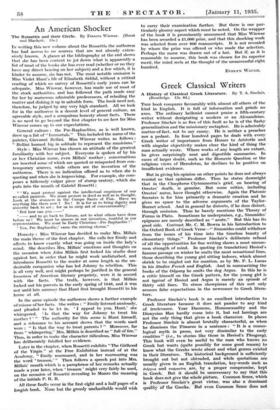An American Shocker
The Rossettis and their Circle. By Frances Winwar. (Hurst and Blackett. 158.)
IN writing this new volume about the Rossettis the authoress has had access to no sources that are not already exten- sively known. A glance at the bibliography at the end shows that she has been content to jot down what is apparently a list of most of the books she has ever read (whether or no they have any direct bearing on her subject) and a few which, it is kinder to assume, she has not. The most notable omission is Miss Violet Hunt's life of Elizabeth Siddal, without a critical reading of which no survey of Rossetti's early years can be adequate. Miss Winwar, however, has made use of most of the stock authorities, and has followed the path made easy for her by numerous admirable predecessors, of reboiling the matter and dishing it up in saleable form. The book need not, therefore, be judged by any very high standard. All we look for in the authoress is a decent level of general culture, an
agreeable style, and a scrupulous honesty about facts. There is no need to go beyond the first chapter to see how far Miss Winwar comes up to our expectations.
General culture : the Pre-Raphaelites, as is well known, drew up a list of "Immortals." This included the name of the painter, Giovanni Bellini. Miss Winwar writes as follows : " Bellini loomed big in solitude to represent the musicians."
Style : Miss Winwar has chosen an attitude of the greatest familiarity with her subject. Everyone is spoken of by his or her Christian name, even Millais' mother ; conversations are inserted some of which are quoted or misquoted from con- temporary sources, while others are the invention of the authoress. There is no indication offered as to when she is quoting and when she is improvising. For example, she com- poses a hideously vulgar piece of stump oratory, which she puts into the mouth of Gabriel Rossetti :
" We must protest against the intellectual emptiness of our so-called painters. We must protest in deed as well as in thought. Look at the stunners in the Campo Santo of Pisa. Have wo anything like them now ? No ! It is for us to bring dignity and sincerity back to art ; for us to strip art of conventionality.'
But how can you —' — and to go back to Nature, not to what others have done before us ! We must be sincere in our invention, truthful in our representation. We must be Early Christian—Pre Raphaelite ! '
Yea, Pre Raphaelite,' came the stirring chorus."
Honesty : Miss Winwar has decided to make Mrs. Millais the main theme of the first chapter. She calls her Emily and affects to know exactly what was going on inside the lady's mind. She describes Mrs. Millais' emotions and thoughts on the occasion when John Millais first locked his studio door against her, in order that he might work undisturbed, and introduces Rossetti to the reader at some length as the un- desirable companion who has led Johnny to rebellion. This is all very well, and might perhaps be justified in the general looseness of American literary propriety, were it in accord with the facts. The truth, however, is that Millais locked out his parents in the early spring of 1848, and it was not until late summer that Hunt first brought Rossetti to his home at all.
In the same episode the authoress shows a further example of misuse of her facts. She writes : " Emily listened anxiously, and pleaded to be let in. ' I appeal to you, Hunt,' she whimpered. Is that the way for Johnny to treat his mother ? ' " The authority for this scene is Hunt himself, and a reference to his account shows that the words used were : " Is that the way to treat parents ? " Moreover, far
from " whimpering," Mrs. Millais is described as " full of fire." Thus, in order to make the character ridiculous, Miss Winwar
has deliberately falsified her evidence.
Later in the chapter, when Rossetti exhibits "The Girlhood of the Virgin " at the Free Exhibition instead of at the Academy, " Emily murmured, and in her murmuring was the word ' treason.' " Then follows a speech put into Mrs. Millais' mouth which is a paraphrase of her remarks actually made a year later, when ' treason ' might very fairly be used, on the occasion of Rossetti revealing to Munro the meaning of the initials P. R. B.
All these faults occur in the first eight and a half pages of a longish book. None but the grossly uncharitable would wish to carry their examination further. But there is one par- ticularly gloomy aspect which must be noted. On the wrapper of the book it is prominently announced that Miss Winwar has been awarded a £1,000 prize, and that this shocking work was selected from over 800 manuscripts. It is not revealed by whom the prize was offered or who made the selection. Perhaps the name was drawn out of a hat. But if, as it is reasonable to assume, this book was chosen for its superior merit, the mind reels at the thought of the unsuccessful eight hundred.
EVELYN WAUGU.






































 Previous page
Previous page